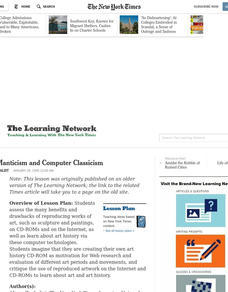Curated OER
CD-ROManticism and Computer Classicism
Students assess the many benefits and drawbacks of reproducing works of art, such as sculpture and paintings, on CD-ROMs and on the Internet, as well as explore art history via these computer technologies.
Curated OER
What's New?
Students act as teams of product managers for personal electronics companies. Each team evaluate new electronic devices in different product categories (such as handheld devices and portable music devices), and create product...
Curated OER
Oasis in the Desert
Students explore the challenges of building a thriving human civilization in a desert environment. They design new technologies to assist people living in the desert.
Curated OER
Getting the Message Across
Students discover the emergence of e-mail as a popular communication tool and explore its impact on society. They consider the advantages and disadvantages of different types of communication tools in various creative contexts.
Curated OER
Baseball Statistics
Students take an in depth examine baseball record breakers. They calculate statistics, not just for one year, but over whole careers, to compare some famous players and find who was the best all-time home run hitter.
Curated OER
The Sahara: Home of the Tuareg
Students research and analyze the Tuareg and other groups as well, including their own, and examine the impact culture has on environment.
Curated OER
Stonehenge: Solving Ancient Mysteries
Students explore archeologists and anthropologists and the tools and methods they use to gather and interpret scientific evidence. They research current archaeological excavations and contact the scientists working at these digs.
Curated OER
The Proof of the Century!
Students do Web research in the field of mathematics. They explore mathematical proofs and apply them to the Pythagorean theorem. They also explore the general ideas of Fermat's Last Theorem
Curated OER
Patterns to the Rescue
Students watch the Cyberchase episode, "The Poddleville Case" and play online games to examine how patterns are sequences that repeat or change in an orderly way. The lesson plan culminates with students creating their own patterns to...
Curated OER
Living on Your Own -- Let's Calculate the Cost!
Young scholars review basic math skills, such as addition, subtraction, multiplication, division, finding averages, and working with percentages. They see how these skills apply to real life situations.
Curated OER
The Great Grizzly
Students generate questions about grizzly bears and use the Internet to research the answers. As a culminating activity, students create a life-size mural of a grizzly that is annotated with the information they've learned.
Curated OER
Pharaoh Phonetics
Students explain the purpose of hieroglyphics and identify their role in communicating ideas. They research the history of writing and it's significance in ancient Egyptian life and identify the components of hieroglyphics.
Curated OER
Cool! Awesome! What is it?
Students work in small groups to brainstorm hypotheses about mysterious science photographs, read and interpret answers to the science photographs, cooperatively develop a set of clues for the images and develop their own science photo...
Curated OER
Cyber Chow Combos
Students, after watching the CYBERCHASE episode, "A Day at the Spa,"represent and count combinations of choices using tree diagrams.
Curated OER
The Brooklyn Museum of Art Newspaper
By working cooperatively, writers will create a newspaper about the Brooklyn Museum of Art. Each member will take on a different role representing various types of newspaper writers. They will discover the history, exhibits, special...
Curated OER
AIDS, HIV, & Other Microbe Matters
Students conduct inquiry-based research for basic information about microbes, infections, and HIV, the virus that causes AIDS. After gathering answers to their questions, students develop a presentation to post on their school's Web site.
Curated OER
Living With Risk: The Human Element of Natural Disasters
Students explore human elements that are a part of natural disasters, read a Hawaiian myth, conduct a survey, discuss why people choose to live in high risk areas, and participate in a writing activity based on studenT real life accounts...
Curated OER
Creating an Original Opera
Learners research the lyrical and dramatic structure of opera through Internet sources and audio examples, cooperatively discuss elements of opera stories vs. their own lives and create one-act opera based on their own life experiences.
Curated OER
How Media Shapes Perception
Students explain the impact that the media may have in shaping their intellectual and emotional responses to current events. They examine broadcast and Web-based news sites to find subtexts through the use of language, audio, and visual...
Curated OER
What's Matter?
Students explore many of the basic properties of matter including atoms, ions, elements, molecules, and density. The class explores an interactive flash-animated Web site to answer questions and clarify misconceptions they might have had...
Curated OER
Latino Contributions To American Culture
Students create their own working definition of what it means to be an American. They examine the achievements of Latinos and discuss how the contribution of these Americans have enriched and helped shape American culture.
Curated OER
Keep on Standing!!
Students conduct research on the Internet about earthquakes and buildings that have withstood them. They suggest designs for future buildings. They create models of their suggested designs. Their models are tested in an earthquake...
Curated OER
The Immigrant Experience In America
Learners study immigration, Ellis Island, and tenement life from 1890 to 1924. Each student create an identity of an immigrant and write an essay in the first person. Essays describe what they found when they arrived in New York City.
Curated OER
Exploring Heroism
Students examine the concept of heroism in this instructional activity, through personal reflection, group activities and a thoughtful analysis of the documentary, HEROES OF GROUND ZERO. They explore their own understanding of what it...

























